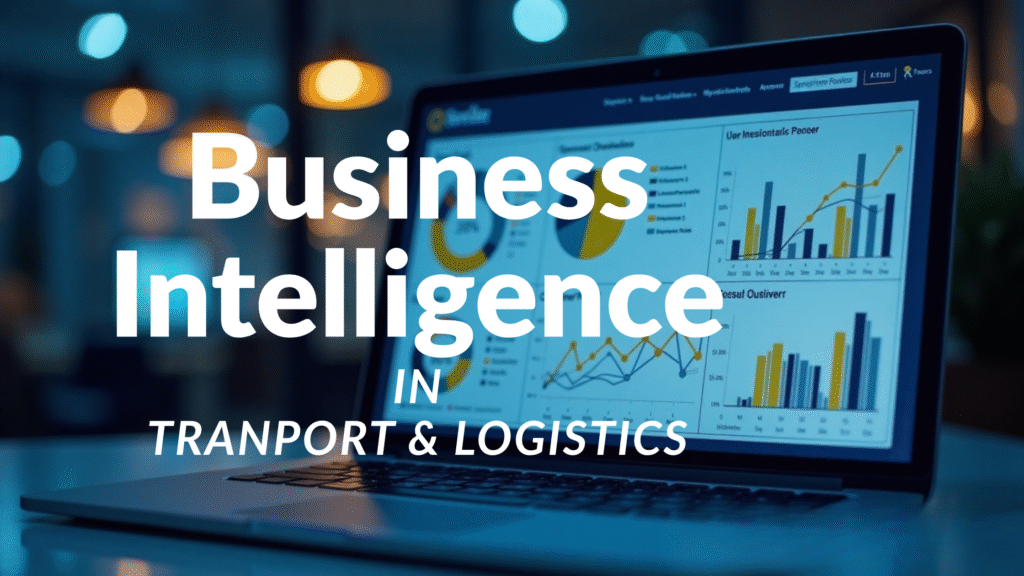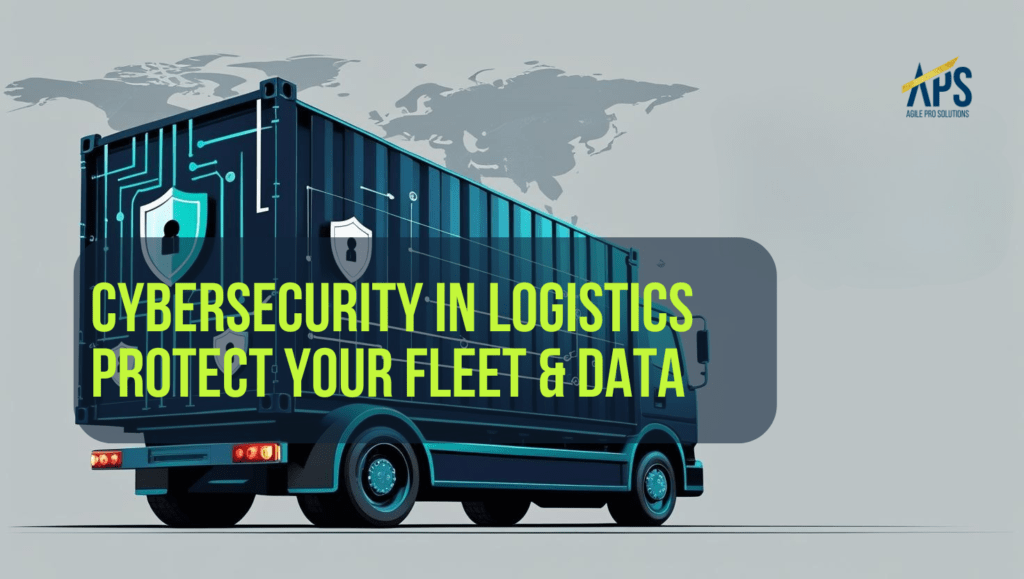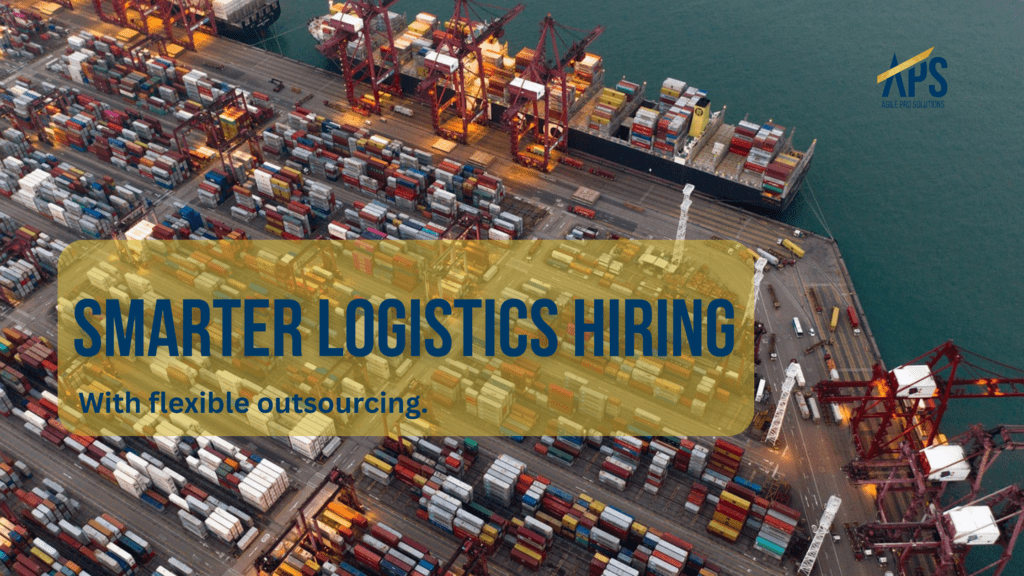How Business Intelligence is Reshaping Logistics Companies

How BI is Transforming Logistics Companies | APS How Business Intelligence is Reshaping Logistics Companies In logistics, every minute matters. A late shipment, an inefficient route, or a small miscalculation can ripple into significant costs. That’s why forward-thinking logistics companies are turning to Business Intelligence (BI) to stay competitive. With BI, data isn’t just stored — it’s transformed into real-time insights that drive better decisions. The Data Challenge in Logistics Traditional logistics operations rely on fragmented systems, spreadsheets, and manual reporting. This creates delays, errors, and blind spots. Without visibility into performance, companies risk higher costs and dissatisfied customers. How BI is Reshaping Logistics Companies Real-Time Visibility – BI dashboards centralize fleet, warehouse, and order data, allowing leaders to see what’s happening at every step of the supply chain. Key Benefit: Faster response to disruptions like delays or equipment issues. Smarter Routing & Scheduling – With BI, companies analyze traffic, fuel costs, and delivery times to optimize routes and schedules. Key Benefit: Reduced fuel costs and improved on-time delivery. Cost Control & Efficiency – BI highlights inefficiencies such as underutilized trucks, idle labor, or bottlenecks. Key Benefit: Lower operational costs and better resource allocation. Customer-Centric Insights – Tracking delivery performance and response times provides valuable insights for customer service. Key Benefit: Increased customer satisfaction through accurate ETAs and proactive updates. Strategic Growth Decisions – BI turns raw data into actionable intelligence, guiding decisions about expansion, partnerships, and new market opportunities. Key Benefit: Smarter, data-backed growth strategies. The APS Advantage At Agile Pro Solutions (APS), we help logistics companies implement BI solutions that integrate seamlessly with their operations. Our UpSourcing™ model combines dedicated European professionals with BI dashboards, ensuring that logistics leaders don’t just collect data — they act on it. Conclusion The logistics companies that will lead in 2026 and beyond are those that embrace data-driven decision-making. BI is no longer optional — it’s essential. Ready to see how BI can reshape your logistics operations? Book a Free Consultation
Logistics Cybersecurity Solutions: Safeguard Your Fleet and Data

Cybersecurity in Logistics: Protect Your Fleet & Data Cybersecurity Cybersecurity in Logistics: Protect Your Fleet & Data As logistics companies become more reliant on technology to manage fleets, track shipments, and streamline operations, cybersecurity has never been more critical. The Critical Reality Cyberattacks can halt operations, expose sensitive data, and cause irreversible damage to a company’s reputation. At APS, we understand the logistics industry’s unique digital risks — and we’re here to help protect what keeps your business moving. Rising Threats in a Connected Supply Chain Today’s logistics networks are more connected than ever, but with connectivity comes vulnerability. From GPS tracking to automated warehousing systems, every digital touchpoint is a potential entry for cybercriminals. Why Logistics Needs Cybersecurity Support Hackers often target logistics companies because of the critical role they play in the supply chain. Ransomware, phishing attacks, and data breaches are on the rise. ⚠️ Companies without proper cybersecurity infrastructure risk downtime, financial loss, and legal repercussions. APS Cybersecurity Services Built specifically for logistics businesses Network Monitoring Advanced threat detection and real-time network monitoring Data Encryption Secure access control and comprehensive data protection Incident Response Rapid response and comprehensive recovery planning Employee Training Comprehensive cybersecurity awareness and training programs Why Partnering with APS Makes a Difference We don’t just protect your systems — we help you build a resilient operation. Our cybersecurity experts work as an extension of your team, ensuring your fleet stays secure and your data stays private. Ready to Transform Your Logistics? Schedule a demo to see how our transport and logistics solutions can streamline your operations. Schedule Demo Call
Fixing hiring costs in logistics: Why Outsourcing is the smart move

Fixing Hiring Costs in Logistics: Why Outsourcing Is the Smart Move In today’s fast-paced logistics industry, efficiency is a survival tool. Whether you’re managing warehousing, freight coordination and movement, or supply chain planning, the cost of hiring and retaining talent can quickly get out of control. Between salaries, training, onboarding, and the constant struggle to find experienced staff, logistics companies are under pressure to do more with less. The solution? Outsourcing. Here’s how outsourcing helps fix hiring costs in logistics and why more companies are making the switch to this solution. Reduced Labor Costs One of the biggest advantages of outsourcing is the ability to tap into global talent pools. By outsourcing logistics roles to countries with lower labor costs, like North Macedonia, companies can access skilled European professionals for a different price than the local hires. You’re not sacrificing quality. You’re simply paying less for the same or even better level of expertise. No More Recruiting Headaches Hiring is expensive. Between advertising job posts, running interviews, and training new employees, the recruitment process eats up time and money. When the turnover hits, which is common in logistics, the cycle starts all over again. Outsourcing eliminates this burden and moreover APS maintains 100% retention rate of employees. APS handles recruitment, vetting, onboarding, and HR, giving you a fully managed team without the overhead. Scalable Teams On-Demand Logistics isn’t predictable. You might need more staff during peak seasons and fewer during quiet months. Traditional hiring doesn’t offer this kind of flexibility. With outsourcing, you can scale your team up or down depending on your operational needs, without the long-term commitment or extra cost of maintaining full-time employees year-round. Faster Ramp-Up Time Outsourcing partners often provide professionals who are already trained in logistics processes and platforms from WMS (Warehouse Management Systems) to TMS (Transportation Management Systems). This means you’re not starting from scratch. Instead, you have shorter ramp-up periods and faster productivity. Focus on Strategy and Execution, Not Administrative Work When your internal team isn’t preoccupied by daily logistics tasks, they can focus on big-picture goals: improving customer experience, optimizing supply chain performance, and growing the business. Outsourcing lets you offload routine operations so your in-house experts can do what they do best. Outsourcing isn’t just about cutting costs. It’s about working smarter, gaining flexibility, and staying competitive in an industry that’s constantly evolving. If you’re looking to reduce hiring expenses, streamline operations, and still maintain high-quality service, outsourcing logistics roles might just be your smartest business move this year.
Sustainability in Logistics: How Green Transportation Practices Are Changing the Industry

Sustainability in logistics is no longer a buzzword, it’s a necessity. As global supply chains expand, the environmental impact of logistics operations has come under scrutiny. Companies in the transport and logistics industry are actively adopting green practices, from electric trucks to carbon offset programs, to reduce their carbon footprint and comply with environmental regulations. In this blog post, we’ll explore the key sustainable transportation practices transforming logistics and how businesses can leverage these innovations to stay ahead in a greener future. The Rise of Green Logistics Traditional transportation methods heavily rely on fossil fuels, contributing to carbon emissions and environmental degradation. With increasing government regulations, corporate sustainability goals, and consumer demand for eco-friendly solutions, the logistics industry is shifting toward greener alternatives. 1. Electric Trucks: Redefining Freight Transport Electric vehicles (EVs) are making significant inroads into the logistics sector. Companies like Tesla, Volvo, and Daimler have introduced electric trucks that offer several benefits: 2. Alternative Fuels: A Shift Away from Diesel Alternative fuels are another game-changer in sustainable logistics. Companies are increasingly adopting biofuels, hydrogen fuel cells, and compressed natural gas (CNG) to reduce dependency on traditional diesel-powered fleets. Popular Alternative Fuels in Logistics: 3. Carbon Offset Programs: Compensating for Emissions While reducing emissions is the priority, companies are also investing in carbon offset programs to neutralize their environmental impact. These programs allow businesses to compensate for their carbon footprint by funding projects such as: Brands like UPS and DHL have already integrated carbon offset initiatives into their operations, allowing customers to choose carbon-neutral shipping options. The Business Case for Sustainable Logistics Adopting green logistics practices isn’t just about environmental responsibility, it’s also a smart business move. Here’s why: How Agile Pro Solutions Supports Green Logistics At Agile Pro Solutions, we understand the importance of sustainability in logistics. Our dedicated teams work closely with businesses to optimize their supply chain operations, improve efficiency, and implement eco-friendly solutions. Our Contributions to Green Logistics: Final Thoughts Sustainability in logistics is more than a trend, it’s the future. By embracing electric trucks, alternative fuels, and carbon offset programs, businesses can reduce their environmental impact while improving efficiency and profitability. The shift toward green transportation is gaining momentum, and companies that act now will position themselves as industry leaders in sustainable logistics. Let Agile Pro Solutions help you build a sustainable and cost-effective logistics strategy. BOOK A CALL + GUIDE
Can Outsourcing Scale Your Logistics Business?

Scaling a logistics business comes with challenges, but outsourcing can turn those roadblocks into opportunities. From unlocking internal capacity to accessing top-tier talent and reducing overhead, a strategic outsourcing approach streamlines operations and drives growth. Discover how Agile Pro Solutions helps logistics companies scale efficiently without the growing pains.
Commonly Outsourced Logistics Roles (and Why They Work)

Logistics is a fast-moving industry, and handling everything in-house can slow you down. Outsourcing key roles, like freight brokerage, dispatch, track and trace, and customer support, saves time, cuts costs, and keeps your operations running smoothly. Focus on growth while experts handle the rest.
Key Logistics Metrics That Drive Real Performance

Let’s talk about what truly separates high-performing logistics companies from those barely getting by. It’s not just having the latest technology or the biggest fleet—it’s about mastering your logistics metrics. Now, I’m not talking about getting lost in spreadsheets or tracking everything just because you can. I mean focusing on the logistics metrics that actually impact your bottom line. Because if you’re not tracking the right data, you’re not managing a business—you’re rolling the dice. Why Most Logistics Companies Get Metrics Wrong Many logistics businesses operate without clarity. Some drown in irrelevant data; others rely solely on gut instincts. The result? Missed opportunities, poor decisions, and shrinking margins. But here’s the truth: logistics metrics are your map. They show you where you are, where the problems lie, and how to improve. Without them, you’re flying blind. 1. On-Time Delivery Rate: The Trust Metric One of the most critical logistics metrics is your on-time delivery rate. If you’re missing deadlines, you’re losing trust—and trust is hard to rebuild. Most customers won’t complain when things go wrong—they’ll just disappear. Track your on-time delivery rate religiously. Understand the root causes of delays—be it poor route planning, warehouse bottlenecks, or traffic. Aim for 95%+ consistently. If you’re below that mark, it’s a red flag that deserves immediate attention. 2. Cost Per Mile: The Silent Profit Killer Next up: cost per mile. Every mile driven costs money—fuel, wages, maintenance, and more. Yet surprisingly, many companies have no real grasp of this number. By tracking cost per mile, optimizing routes, and reducing deadhead miles, successful logistics firms find ways to save big. Even shaving off a few cents per mile can translate to thousands in additional profit over time. This is one of the logistics metrics that can make or break your margins. 3. Order Accuracy: Mistakes Are Expensive Let’s be honest—errors hurt. A wrong order creates chaos: unhappy customers, wasted time, and damaged reputation. Tracking your order accuracy rate is essential. Whether issues stem from picking, packing, or data entry, every mistake has a cost. If your accuracy rate falls below 98%, you’re bleeding money. Smart companies use this logistics metric to drive improvements across the supply chain. 4. Warehouse Efficiency: Your Productivity Engine Your warehouse isn’t just storage—it’s the heartbeat of your operation. That’s why warehouse efficiency is one of the most overlooked yet powerful logistics metrics. Measure how many orders are fulfilled per hour, track inventory accuracy, and identify delays. Streamlined warehouses speed up delivery, reduce labor costs, and boost customer satisfaction. 5. Freight Cost Per Unit: The Competitive Edge Freight costs often spiral out of control without anyone noticing. If you’re not monitoring freight cost per unit, you’re risking your competitive edge. Track this metric closely. The best in the business reduce freight costs through load optimization, rate negotiation, and smarter shipment planning. Lower freight costs give you more pricing flexibility and stronger profit margins. 6. Customer Satisfaction: The Loyalty Builder Here’s the metric most companies think they have covered—but usually don’t. Customer satisfaction is more than just reviews. It’s about patterns in feedback, repeat orders, and retention rates. Are your customers happy enough to stay? Or are they quietly drifting to competitors? Use surveys, follow-ups, and account reviews to quantify customer satisfaction. It’s cheaper to keep a loyal client than to win a new one. 7. Driver Performance: The Frontline Factor Your drivers are your brand ambassadors. That’s why driver performance must be part of your logistics metrics stack. Monitor on-time arrivals, fuel usage, and safety scores. High-performing drivers reduce accidents, save on fuel, and improve the customer experience. Investing in your drivers always pays off. Final Thought: Data-Driven Logistics Wins At the end of the day, successful logistics companies don’t guess—they track, optimize, and evolve. They don’t get distracted by vanity numbers or complex dashboards. They focus on the logistics metrics that move the needle. So here’s the question: Are you in control of your numbers, or are you still hoping things just work out? Because the businesses that win? They know their logistics metrics inside and out.
